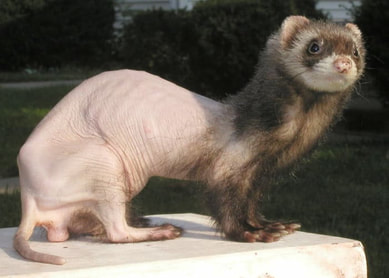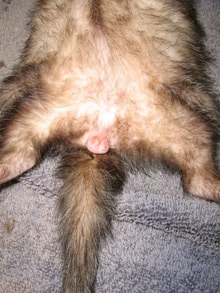|
FERRET SOUNDS
Unlike dogs and cats, ferrets don’t “bark” or “meow.” But If you listen carefully you will hear your ferret vocalize. Ferrets make different noises for different emotions. Some ferrets are more “talkative” than others. Ferret owners describe the sounds that their ferrets make: “Dook” (or “Brap”) – A fast clucking noise that your ferret may make when s/he is “happy.” You may hear this sound when your ferret greets you or is playing. “He He He” – Ferrets seemed to be jokers. They may steal your shoe and run away laughing at you in their quiet way! “Hiss” - Ferrets make this “breath” sound when they are annoyed or “angry.” A ferret may hiss at another ferret that is playing too roughly. “Bark” – Rarely heard in ferrets, this is a loud chirp that a ferret makes when s/he is very excited, frightened, or sick. If you hear this sound, check your ferret right away. Make sure that it is not choking, or having a seizure. . “Screech” – This is a very high-pitched sound. Immediately after it, the ferret vocalizes a rapid chattering sound. The screech is a reaction to pain, fright, or anger. This is one of sounds, you need to check out what your ferret is doing. Go check out that ferret. “Whine” – This is a low moan or cry. Your ferret vocalize to get your attention, he or she may be scared, hurt and in pain. Please go check out the ferret.
|
|
Terms and Conditions
|
allFerrets® 2014-2024. ALL RIGHTS RESERVED.
Proudly designed by widgIT |



 RSS Feed
RSS Feed
